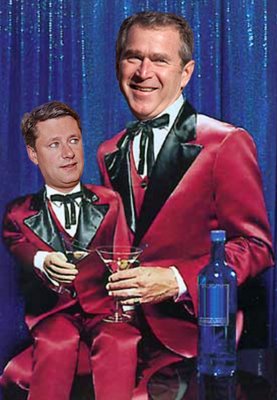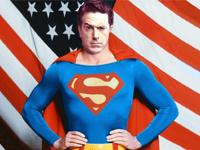Best of Luck to you Mr. Lambert...
Macleans, May 1, 2006
A crackdown on the media in Uganda puts a Canadian journalist on a plane for writing about First Lady Janet Museveni
ALAN MARTIN
Blake Lambert is no shrinking violet, but even he is surprised to find himself at the centre of a debate about press freedom in Uganda. The 34-year-old Canadian journalist, who has lived in Uganda for the last three years and reported for a range of media outlets including the CBC, Christian Science Monitor and The Economist, was denied entry to the east African country on his return from a holiday on March 9. His crime? "Consistently misrepresenting and misreporting the situation" in Uganda, according to a government official. For good measure, he was labelled "a national security threat," and put on the next plane to neighbouring Kenya.

"Government officials have never explained my offences or how I imperilled national security. Nor have they bothered to substantiate the charges," says the Toronto native. His expulsion has raised eyebrows about the direction of the government of President Yoweri Museveni, a reformer who has turned around the fortunes of the once-failed state. It has also set off a fierce debate about the future of press freedoms in a country once considered a role model for others making the difficult transition to a liberal democracy -- but one where some observers are now seeing a progressively more authoritarian trend.
Several observers cite Lambert's coverage of the first lady, Janet Museveni, as the most likely reason for his expulsion. On one occasion, he noted a slight increase in the prevalence of HIV/AIDS, and linked it to her opposition to condoms. As a born-again Christian and proponent of abstinence, she had allegedly used her influence to hold up the importation of millions of condoms. Another article concerned the climate of intimidation surrounding her successful run for Parliament in the February elections. "You go after Museveni's family at your own peril," says opposition MP Morris Ogenga-Latigo, an acquaintance of Lambert's. "While you can't fault Blake for getting his facts right, I think he underestimated how hypersensitive Museveni becomes when someone touches his family."
Foreign journalists first learned of a change in the wind when the government summoned them to a meeting in January and announced they would have to register with the newly formed Media Centre, which counts among its senior officials at least two members of the Ugandan military. Journalists were also told they could no longer travel more than 100 km outside the capital, Kampala, without special permission; failure to comply could result in arrest or deportation. Journalists were also told to submit copies of their work for approval. "There is certainly an effort to tighten the screws, not only with the press," says a senior Western diplomat who spoke to Maclean's on condition of anonymity. "It's largely an attempt by the government to better control its image."
Coming in the aftermath of February's hard-fought election in which Museveni was accused of using heavy-handed tactics to hold on to power, reaction to the new press laws and Lambert's subsequent deportation was swift, and critical. "Mr. Lambert's treatment signals a wider attempt by President Museveni to muzzle the press," The Economist wrote. Describing the reasons for Lambert's expulsion as "Kafkaesque," it went on to warn of bleaker days ahead. "The message is clear: any reporter picking at the competence of President Museveni's administration can expect something nastier than a brusque cheerio at Entebbe airport."
Lambert is not alone in his run-ins with the government. Three Ugandan journalists -- radio station KFM's Andrew Mwenda and the Weekly Observer's James Tumusiime and Semujju Ibrahim Nganda -- were arrested and charged with sedition and "promoting sectarianism" in the run-up to the election. Attempts by the Daily Monitor to run a parallel count during the election -- which Museveni won by 59 per cent to opposition leader Kizza Besigye's 38 per cent -- were thwarted by the government, and the paper continues to be threatened with closure for stories that cast Museveni in an unfavourable light.
The government recently paid US$1 million for a series of ads on CNN to boost the country's "brand image." Critics now say that, with the new repressiveness, that was for naught. "The government has scored an own goal on this," says William Pike, managing editor of the government-run daily New Vision. And Lambert thinks his deportation is symptomatic of a larger malaise afflicting Museveni's administration. "The government wants to suppress criticism as it shows increasing signs of dysfunction, due to corruption and poor decision-making," he says. "Since Museveni isn't going anywhere, freedom for the press likely can't be sustained because it will highlight the government's flaws."
Some British papers have gone so far as to ask whether Museveni is the "next Mugabe" -- a reference to Zimbabwe's authoritarian and erratic leader. Many Ugandans, though, say that is overstating things. The country has often been touted as an African success story, and Museveni is widely considered the chief mentor to the "new breed" of African leaders who brought democracy, stability and economic liberalism in the early 1990s. He ended, for the most part, almost two decades of civil strife that claimed more than 500,000 lives. Under his agenda, Uganda had an average annual economic growth rate of 3.2 per cent for most of the last decade, an expanding middle class, and a drop in poverty. Museveni's biggest achievement may have been the initial response to the HIV/AIDS pandemic: largely through a massive education campaign, Uganda radically reduced the prevalence of infection, from about 18 per cent in the early 1990s to 6.5 per cent in 2005.
But Museveni risks squandering his own legacy. The 20-year conflict in the north against the militarily inferior Lord's Resistance Army continues unabated. Some 1.5 million people continue to be warehoused in fetid and HIV-ridden camps for the displaced. Senior army commanders, including the former head of the Ugandan People's Defence Force, Maj.-Gen. James Kazini, have been accused of prolonging the war in the north for personal financial gain.
And although Uganda has always been considered somewhat of a "democratic dictatorship," observers and opposition politicians note a growing lack of tolerance by the Museveni government. Kizza Besigye, a former comrade and personal physician to Museveni, was forced into exile after challenging him for the presidency in 2001. Upon his return in 2005 to run again, the retired colonel was charged with treason and faces a military court martial. (For good measure, a bogus rape charge was levelled on the eve of the election, hampering Besigye's campaign because he had to make regular court appearances. He was later acquitted.)
Museveni also appears to be losing the fight against corruption. The health minister, Maj.-Gen. Jim Muhwezi, is currently embroiled in a damning inquiry into the misuse of funds from the Geneva-based Global Fund on AIDS, Tuberculosis and Malaria. During difficult questioning from the chief prosecutor into his alleged misappropriation of money, one retort by an unrepentant Muhwezi was characteristic of top officials' response to any criticism. "When there has been a call for patriotism and statesmanship, I have been there," Muhwezi said. "I don't know, my lord, where you were at that time, but the peace and tranquility and rule of law which prevails today, I was part of." The rebuke was clear: we are beyond reproach because we liberated the country.
And despite Museveni's past ruminations on the dangers of tribalism and its relationship to political instability, key positions in the civil service, military and police are now in the hands of the Banyankole, Museveni's ethnic group. Those from the northern Nilotic tribes are largely excluded from positions of power -- an ominous echo of the late 1960s and early 1970s, when employment along tribal lines led to a spate of coups. That increased "ethnicization" of Ugandan politics and Museveni's intention to govern indefinitely is causing growing skepticism among outside observers about the country's future. "The bloom is off the rose," says one Western diplomat. "Museveni is definitely no longer an A-list African leader. What's worrying is his lack of vision. Power is increasingly focused on his clique or family. Over the medium term, that's just not stable."
Foreign aid donors, on whom the government relies for over 45 per cent of its budget, are losing faith. European contributors -- including the largest, Britain -- are scaling back aid and finding better places to put their money. So too are foreign news agencies. And Lambert, back in Toronto plotting his next move, is still trying to make sense of what has happened to him. "My family and friends find it hilarious that I posed any kind of threat to the Ugandan government and that I've been declared persona non grata," he says. "Frankly, so do I."
To comment, email letters@macleans.ca
























